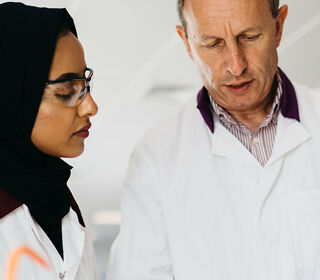
Blog Article

Having experienced the recent COVID19 pandemic, nobody can deny the impact of microorganisms on human health and wellbeing or their ability to spread rapidly around the world. Studying microbiology provides a deeper understanding of the microscopic organisms influencing every aspect of life on Earth from human health and wellbeing to environmental sustainability, industrial or commercial applications.
By studying interactions of bacteria, viruses, fungi, and other microbes, we can explore solutions to pressing issues, such as treatment for infectious disease, food safety issues, advancement of agriculture, biotechnology.
An extensive knowledge of the tiny microorganisms is crucial for addressing global challenges like antibiotic resistance, zoonotic disease, pandemics, environmental pollution - the list goes on!
Dr Martin Goldberg is a senior lecturer in Clinical Microbiology at Birmingham City University. He teaches Clinical Microbiology on the BSc Biomedical Science course to undergraduate students and food safety microbiology and microbiome research to postgraduate dietetics students. Students on these courses often go on to work in the health and pharmaceutical industries or in research and development.
Biomedical Sciences Course
Want to learn more about Clinical Microbiology for yourself? See our Biomedical Sciences course.
He has a wide range of expertise, including clinical and diagnostic microbiology, bacterial molecular biology, genetics, food microbiology and safety, discovery of novel antimicrobial compounds and bacterial physiology. His current research interests focus on the discovery of antimicrobial compounds from natural sources.
Martin is in the process of developing and producing a series of lectures for an online learning resource, Henry Stewart Talks, aimed at introducing Microbiology to Level 4 students, healthcare professionals, academics and industry across the world.
You can check out the first of the lectures here: Antibiotics and Antibiotic Resistance.
The upcoming course of lectures will cover the following topics:
- Microbial physiology and function
- Growth and nutrition
- Biochemistry and metabolism
- Classification, systematics, and identification
- Microbial genetics
- Antibiotics and resistance
- Sterilisation and disinfection
- Rapid methods in microbiology
- The human microbiome in health and disease
- Biofilms
- Microbial strategies in disease
- The changing epidemiology of infectious diseases
- Introduction to fungi
- Introduction to viruses
The series of lectures provides an essential foundation to the study of microbiology and can be used as a resource for future specialised lectures on themes such as food safety, clinical microbiology, pharmaceutical microbiology, and biotechnology.
Explore Health Sciences Research at Birmingham City University